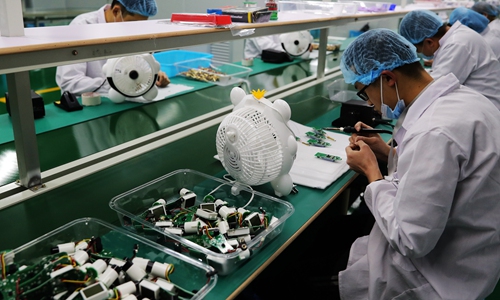HOME >> SOURCE,SPECIAL-COVERAGE
Chinese exported thermal detectors deserve more attention overseas: insiders
By Yin Yeping Source:Global Times Published: 2020/4/1 21:43:40
Devices can help arrest spread of pandemic: expert

Workers produce forehead thermometers in Northwest China's Gansu Province on March 12. Photo: cnsphotos
The COVID-19 pandemic is driving up China's exports of thermal detectors and plants are working overtime to produce the preventive tools to stall the coronavirus' spread. However, industry analysts said that the devices have not been given enough attention and support around the world.
Sally Gao, an employee of Wuhan Guide Infrared, one of the leading suppliers of infrared thermal imaging products in China, told the Global Times on Wednesday that the company has exported about 10,000 units - mainly to the US and Italy - since the epidemic began, and it expects exports to exceed 20,000 by the end of April.
However, production cannot be increased at present due to disrupted supply chains, said Gao.
"Because of the disrupted logistics system and delays in customs clearance, a process that used to take five days now takes 10 or 15 days," Gao said, adding that the company had a shipment that was meant to be delivered a week ago only reaching the hands of US hospitals and universities on Wednesday.
"The items were held by US customs about a week. It normally just takes one day for US customs clearance," she said.
Another issue with distribution is that some delivery services have not resumed work in China.
Gao said that the company has been using DHL since the beginning, but it had to choose another delivery service provider with higher rates after DHL suspended all service in Wuhan from March 27 until April 8.
"Not only is our delivery efficiency further reduced, the cost of raw materials is getting higher," she said, adding that these issues keep the company from increasing output.
The IR236, the company's best-selling hand-held thermal detector, can be produced at a rate of several hundred units a day, the highest capacity yet. Daily production for all models together is less than 1,000, according to Gao.
"The supply of resistors and capacitors is tight, because of growing export demand," Gao said.
Apart from making its own products, the company is doing original equipment manufacturing for foreign brands.
An employee surnamed Xue of Dali Technology, based in Hangzhou, capital of East China's Zhejiang Province, told the Global Times that the company is constantly running at full capacity, with employees working overtime without much rest since the Spring Festival holidays to meet growing overseas demand.
The costs of raw materials and logistics have gone up, but Xue expects that by increasing production, the costs could be maintained at a reasonable level. Xue said despite the higher costs, there are still enough raw materials to ensure daily production.
In terms of logistics, Xue said that it's now being done all by air.
"Delivery is definitely more expensive than before, but there's no way around it. We will bear the extra cost ourselves," he said.
The company, which has been involved in infrared thermal imaging rapid temperature screening since the SARS outbreak in 2003, has shifted its business focus overseas since the coronavirus epidemic has been brought under control in China.
"More than 80 percent of Dali Technology's products are exported to markets including the US, South Korea and some European countries," said Xue, adding that although there have been some problems on the supply side, the local government is helping Dali with the coordination of supply chains.
While the domestic distribution system is functioning well, the international logistics system is another issue, Xue said, without giving details
Chen Hongyan, secretary-general of the Medical Appliances Branch of the China Medical Pharmaceutical Material Association, told the Global Times that she expects demand for thermal detectors to rise as the global pandemic deepens.
"During the outbreak in China, tens of millions of thermal detectors were put into the domestic market, playing an important role for the prevention of the pandemic. But so far, Chinese factories have only received tens of thousands of export orders in terms of units," Chen said.
About 50 percent of the world's thermal detectors are made in China, not including original equipment production for foreign brands, Chen said.
"The daily production capacity of thermal detectors in China is measured in the tens of thousands of units, but there's no comparison with masks. The production of detectors requires much more in terms of raw materials and it involves a complicated process like ventilators," said Chen. "So you cannot rush production."
However, Chen said that it is a concern that there is still not enough attention yet to be given at the administrative level in foreign countries to enable the wide use of fever detection systems in some epidemic-hit countries," she said, adding that these governments should offer more support in the distribution and funding of not only to masks and ventilators but fever detection devices to ease the spread of the pandemic.
Newspaper headline: Fever detectors in spotlight
Posted in: INDUSTRIES,BIZ FOCUS,FEATURE,COVID-19 IDUSTRY DRIVE